#Assamese poem
Explore tagged Tumblr posts
Text
NEW ASSAMESE POEM AND FLASH FICTION by Unique Things
NEW ASSAMESE POEM AND FLASH FICTION by Unique Things
0 notes
Text
"তুমিটো জানাই
এই কবিৰ আৰু একো নাই।
এটাই মাথোঁ কামিজ
তাৰো ছিগো-ছিগো চিলাই।
প্ৰেম নিশ্চয় এনেকুৱাই
আৱৰণ খুলি হৃদয় জুৰায়”
- হীৰেণ ভট্টাচাৰ্য


1 note
·
View note
Text
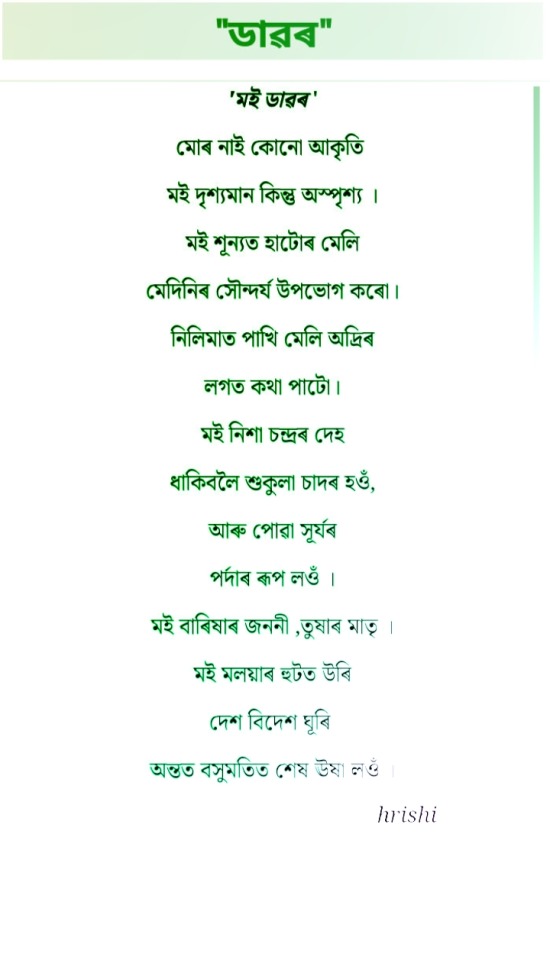
#writerscommunity#words#assamese#assamites#assam#writers and poets#literature#my poem#poetry#assamesepoem
1 note
·
View note
Text
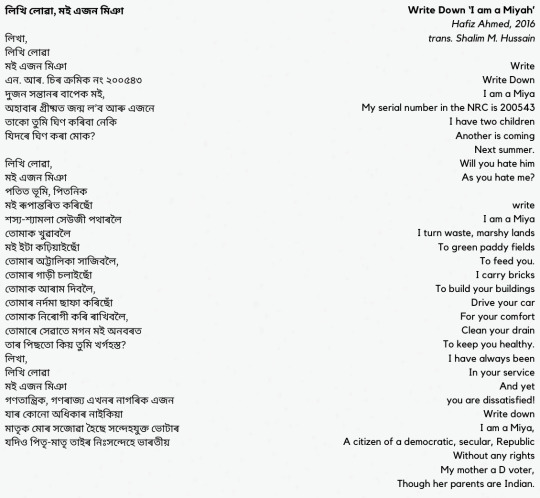

লিখি লোৱা, মই এজন মিঞা ("Write Down 'I am a Miyah'", 2016) by Hafiz Ahmed, translated from Assamese to English by Shalim M. Hussain, began a movement of resistance poetry among Assamese Muslims of Bengali descent, referred to as Miya Poetry after a slur used to describe this community. From Abdul Kalam Azad, for Indian Express ("Write...I am a Miya", 2019):
This poem went viral and other young poets started responding to him through poems. The young poets also started reclaiming “Miya”, a slur used against us, as our identity with pride. This chain of Facebook posts continued for days, reiterating the violence, suffering and humiliation expressed by our community. As time passed, more poets wrote in various languages and dialects, including many Miya dialects. The nomenclature ‘Miya Poetry’ got generated organically but the poets and their associates have been inspired by the Negritude and Black Arts movements, and queer, feminist and Dalit literary movements, where the oppressed have reclaimed the identity which was used to dehumanise them. The trend transcended our community. Poets from the mainstream Assamese community also wrote several poems in solidarity with the Miya poets while some regretted not being poets. Gradually, this became a full-fledged poetry movement and got recognised by other poets, critics and commentators. The quality and soul of these poems are so universal that they started finding prominence on reputed platforms. For the first time in the history of our community, we had started telling our own stories and reclaiming the Miya identity to fight against our harassers who were dehumanising us with the same word. They accused us of portraying the whole Assamese society as xenophobic. The fact is we have just analysed our conditions. Forget generalising the Assamese society as ‘xenophobic’, no Miya poet has ever used the term ‘xenophobic’ nor any of its variants. The guilt complex of our accusers is so profound that they don’t have the patience to examine why we wrote the poems.
Amrita Singh, writing for The Caravan ("Assam Against Itself", 2019), detailed the political backlash against Miya Poetry, in particular the above poem.
On 10 July this year, Pranabjit Doloi, an Assam-based journalist, filed a complaint at Guwahati’s Panbazar police station accusing ten people of indulging in criminal activities “to defame the Assamese people as Xenophobic in the world.” Doloi claimed that the ten people were trying to hinder the ongoing updation of the National Register of Citizens, a list of Assam’s Indian citizens that is due to be published on 31 August. The premise of Doloi’s complaint was a widely-circulated poem called, “Write down I am Miya,” by Hafiz Ahmed, a school teacher and social activist. “Write. Write down I am a Miya/ A citizen of democratic secular republic without any rights,” Ahmed wrote. The police registered a first information report against Doloi’s complaint, booking all ten persons for promoting enmity between groups, among other offences. [...] At the press conference, Mander emphasised that people in Assam are in distress because of the NRC’s arbitrary and rigid procedures. “One spelling mistake when you are writing a Bengali name in English … that is enough for you to be in a detention center, declared a foreigner,” Mander said. “If you are not allowing this lament to come out in the form of poetry, then where is this republic of India going?”
Ahmed's poem is influenced in structure by "Identity Card", a 1964 poem by by Palestinian poet Mahmoud Darwish which uses the symbolic figure of the Palestinian working man to confront Israeli occupiers. Darwish's identity card, a symbol of Israeli subjugation transformed into a cry of Palestinian national identity, is reshaped by Ahmed into the National Register of Citizens for Assam and the accompanying fear of statelessness and disenfranchisement for the Miya people.
This solidarity between writers from oppressed groups is, of course, not one that ends with Darwish and Ahmed, nor with the Black, queer, feminist, and Dalit influences of Miya Poetry. As long as there is oppression, there will be companionship and recognition reflected in art and activism. On December 13, 2023, Black Agenda Report reprinted Refaat Alareer's "If I Must Die", acknowledging the connection between Alareer's poem and "If We Must Die" by Claude McKay, written in 1919 in response to the Red Summer white supremacist riots. In 2000, Haitian community activist Dahoud Andre translated "If We Must Die" into Kreyòl, and the Black Agenda Report editorial honors Alareer in a similar way, reprinting "If I Must Die" with an accompanying Kreyòl translation. (POEM: If I Must Die, Refaat Alareer, 2023.)
Transcripts under the cut.
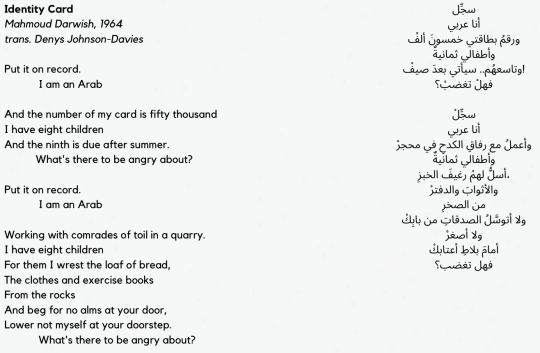

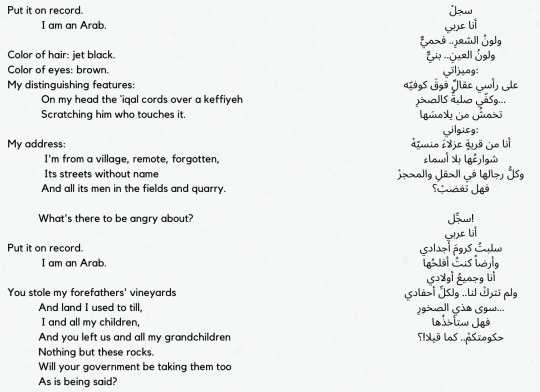

[Hafiz Ahmed Transcripts (Assamese and English):
লিখি লোৱা, মই এজন মিঞা
লিখা, লিখি লোৱা মই এজন মিঞা এন. আৰ. চিৰ ক্রমিক নং ২০০৫৪৩ দুজন সন্তানৰ বাপেক মই, অহাবাৰ গ্ৰীষ্মত জন্ম ল’ব আৰু এজনে তাকো তুমি ঘিণ কৰিবা নেকি যিদৰে ঘিণ কৰা মোক?
লিখি লোৱা, মই এজন মিঞা পতিত ভূমি, পিতনিক মই ৰূপান্তৰিত কৰিছোঁ শস্য-শ্যামলা সেউজী পথাৰলৈ তোমাক খুৱাবলৈ মই ইটা কঢ়িয়াইছোঁ তোমাৰ অট্টালিকা সাজিবলৈ, তোমাৰ গাড়ী চলাইছোঁ তোমাক আৰাম দিবলৈ, তোমাৰ নৰ্দমা ছাফা কৰিছোঁ তোমাক নিৰোগী কৰি ৰাখিবলৈ, তোমাৰে সেৱাতে মগন মই অনবৰত তাৰ পিছতো কিয় তুমি খৰ্গহস্ত? লিখা, লিখি লোৱা মই এজন মিঞা গণতান্ত্ৰিক, গণৰাজ্য এখনৰ নাগৰিক এজন যাৰ কোনো অধিকাৰ নাইকিয়া মাতৃক মোৰ সজোৱা হৈছে সন্দেহযুক্ত ভোটাৰ যদিও পিতৃ-মাতৃ তাইৰ নিঃসন্দেহে ভাৰতীয়
ইচ্ছা কৰিলেই তুমি মোক হত্যা কৰিব পাৰা, জ্বলাই দিব পৰা মোৰ খেৰৰ পঁজা, খেদি দিব পাৰা মোক মোৰেই গাঁৱৰ পৰা, কাঢ়ি নিব পাৰা মোৰ সেউজী পথাৰ মোৰ বুকুৰ ওপৰেৰে চলাব পাৰা তোমাৰ বুলড্জাৰ তোমাৰ বুলেটে বুকুখন মোৰ কৰিব পাৰে থকাসৰকা (তোমাৰ এই কাৰ্যৰ বাবে তুমি কোনো স্তিও নোপোৱা) যুগ-যুগান্তৰ তোমাৰ অত্যাচাৰ সহ্য কৰি ব্ৰহ্মপুত্ৰৰ চৰত বাস কৰা মই এজন মিঞা মোৰ দেহা হৈ পৰিছে নিগ্ৰো কলা মোৰ চকুযুৰি অঙঠাৰ দৰে ৰঙা সাৱধান! মোৰ দুচকুত জমা হৈ আছে যুগ যুগান্তৰৰ বঞ্চনাৰ বাৰুদ আঁতৰি যোৱা, নতুবা অচিৰেই পৰিণত হ’বা মূল্যহীন ছাইত!
Write Down ‘I am a Miyah’ Hafiz Ahmed, 2016 trans. Shalim M. Hussain
Write Write Down I am a Miya My serial number in the NRC is 200543 I have two children Another is coming Next summer. Will you hate him As you hate me?
write I am a Miya I turn waste, marshy lands To green paddy fields To feed you. I carry bricks To build your buildings Drive your car For your comfort Clean your drain To keep you healthy. I have always been In your service And yet you are dissatisfied! Write down I am a Miya, A citizen of a democratic, secular, Republic Without any rights My mother a D voter, Though her parents are Indian.
If you wish kill me, drive me from my village, Snatch my green fields hire bulldozers To roll over me. Your bullets Can shatter my breast for no crime.
Write I am a Miya Of the Brahamaputra Your torture Has burnt my body black Reddened my eyes with fire. Beware! I have nothing but anger in stock. Keep away! Or Turn to Ashes.
]
[Mahmoud Darwish Transcripts (Arabic and English):
سجِّل أنا عربي ورقمُ بطاقتي خمسونَ ألفْ وأطفالي ثمانيةٌ وتاسعهُم.. سيأتي بعدَ صيفْ! فهلْ تغضبْ؟ سجِّلْ أنا عربي وأعملُ مع رفاقِ الكدحِ في محجرْ وأطفالي ثمانيةٌ أسلُّ لهمْ رغيفَ الخبزِ، والأثوابَ والدفترْ من الصخرِ ولا أتوسَّلُ الصدقاتِ من بابِكْ ولا أصغرْ أمامَ بلاطِ أعتابكْ فهل تغضب؟ سجل أنا عربي أنا اسم بلا لقبِ صَبورٌ في بلادٍ كلُّ ما فيها يعيشُ بفَوْرةِ الغضبِ جذوري قبلَ ميلادِ الزمانِ رستْ وقبلَ تفتّحِ الحقبِ وقبلَ السّروِ والزيتونِ .. وقبلَ ترعرعِ العشبِ أبي.. من أسرةِ المحراثِ لا من سادةٍ نُجُبِ وجدّي كانَ فلاحاً بلا حسبٍ.. ولا نسبِ! يُعَلّمني شموخَ الشمسِ قبلَ قراءةِ الكتبِ وبيتي’ كوخُ ناطورٍ منَ الأعوادِ والقصبِ فهل تُرضيكَ منزلتي؟ أنا اسم بلا لقبِ! سجلْ أنا عربي ولونُ الشعرِ.. فحميٌّ ولونُ العينِ.. بنيٌّ وميزاتي: على رأسي عقالٌ فوقَ كوفيّه وكفّي صلبةٌ كالصخرِ... تخمشُ من يلامسَها وعنواني: أنا من قريةٍ عزلاءَ منسيّهْ شوارعُها بلا أسماء وكلُّ رجالها في الحقلِ والمحجرْ فهل تغضبْ؟ سجِّل! أنا عربي سلبتُ كرومَ أجدادي وأرضاً كنتُ أفلحُها أنا وجميعُ أولادي ولم تتركْ لنا.. ولكلِّ أحفادي سوى هذي الصخورِ... فهل ستأخذُها حكومتكمْ.. كما قيلا!؟ إذنْ سجِّل.. برأسِ الصفحةِ الأولى أنا لا أكرهُ الناسَ ولا أسطو على أحدٍ ولكنّي.. إذا ما جعتُ آكلُ لحمَ مغتصبي حذار��.. حذارِ.. من جوعي ومن غضبي!!
Identity Card Mahmoud Darwish, 1964 trans. Denys Johnson-Davies
Put it on record. I am an Arab
And the number of my card is fifty thousand I have eight children And the ninth is due after summer. What's there to be angry about?
Put it on record. I am an Arab
Working with comrades of toil in a quarry. I have eight children For them I wrest the loaf of bread, The clothes and exercise books From the rocks And beg for no alms at your door, Lower not myself at your doorstep. What's there to be angry about?
Put it on record. I am an Arab.
I am a name without a title, Patient in a country where everything Lives in a whirlpool of anger. My roots Took hold before the birth of time Before the burgeoning of the ages, Before cypress and olive trees, Before the proliferation of weeds.
My father is from the family of the plough Not from highborn nobles.
And my grandfather was a peasant Without line or genealogy.
My house is a watchman's hut Made of sticks and reeds.
Does my status satisfy you? I am a name without a surname.
Put it on record. I am an Arab.
Color of hair: jet black. Color of eyes: brown. My distinguishing features: On my head the `iqal cords over a keffiyeh Scratching him who touches it.
My address: I'm from a village, remote, forgotten, Its streets without name And all its men in the fields and quarry. What's there to be angry about?
Put it on record. I am an Arab.
You stole my forefathers' vineyards And land I used to till, I and all my children, And you left us and all my grandchildren Nothing but these rocks. Will your government be taking them too As is being said?
So! Put it on record at the top of page one: I don't hate people, I trespass on no one's property.
And yet, if I were to become hungry I shall eat the flesh of my usurper. Beware, beware of my hunger And of my anger!
]
#it speaks!#re: the tag on my last reblogged post. decided to make that point its own post!#this is long obviously and im employing proper capitalization for ease of reading#obligatory im monolingual disclaimer & cant vouch for translation quality; i chose the johnson-davies translation because ->#<- it is the one i see most commonly spread. i take responsibility for any deficiencies.#going to use some tags because im personally interested in this poetic movement & connection & maybe other people will be too!#palestine#palestinian poetry#assam#miya poetry#political poetry#poetry#in translation
65 notes
·
View notes
Text
Upendra Chandra Lekharu, a celebrated figure in Assamese literature, was born on January 26, 1909.
Renowned for his profound yet simple writing style, Lekharu delved into themes of social consciousness and Assamese culture.
His notable works include poems like "Bakharar Bihu" and plays such as "Bhula Namar Ghar," which addressed social issues of his time. Lekharu's contributions have left a lasting impact, inspiring generations of writers and readers while preserving Assamese heritage.
In memory of Upendra Chandra Lekharu, we have uploaded a new video on YouTube.
Feel free to check out ☺
youtube
1 note
·
View note
Text
তুমিহীন জীৱন – ৰেহান চৌধুৰী
কবিতাৰ শিৰোনাম Assamese Poem
তুমিহীন জীৱন – ৰেহান চৌধুৰী
তুমিহীন এই জীৱনখন, ভাঙি যোৱা এটুকুৰা কাঁচ,
পোনে পোনে বুকুৰ মাজত, জ্বলন্ত শিখা, তন্দ্ৰা লাশ।
সপোনবোৰ আঁতৰিলে, মনৰ আকাশত নাই তৰা,
দিনটো যেনেতেনে যায়, ৰাতি বিষাদৰ পাৰ নকৰা।
নিকোটিনৰ ধোঁৱাত জ্বলে, হৃদয়ৰ স্মৃতিবোৰ,
প্ৰতিটো টানত থমকি থাকে, জীৱনৰ গতিৰ ডোৰ।
মাকৰ চকুত বৰষুণ, দেউতাৰ মুখখন মলিন,
“ল’ৰাটো ক’ত হেৰালে?”—প্ৰশ্ন মাকৰ ওঁঠেৰে ৰাতিদিন।
ৰাতি হয় ভোৰ চাৰিটা, পোৱা হয় বা’ৰ বজাত,
ৰাস্তাৰ কাষৰ চা দোকনত, পাৰ হয় আধা জীৱন তাত।
সময়ৰ ভাত সময়ত নাখায়, জীৱন হ’ল নাশ,
প্ৰেম মানুহক আশা দিয়ে, প্ৰেমতেই সৰ্বনাশ।
Welcome to Barpeta.org, your one-stop destination for all things related to news, we provide Assam Latest Job Notification and wiki insights, with School & College Class 8 to 12 All Subject Question & Answer, Results Admit Card, etc. Our platform is dedicated to keeping you informed and empowered with the latest updates from Barpeta, Assam and beyond.
0 notes
Text
The National UN Volunteers-India
Martyr's Day (Shaheed Diwas) - January 30, 2025
Martyr’s Day, also known as Shaheed Diwas, is a day of solemn remembrance in India. It honors the brave individuals who fought for the country’s freedom. This day is observed on various dates, with the most significant ones being January 30th, which marks the anniversary of Mahatma Gandhi‘s passing, and March 23rd, which commemorates the courage of Bhagat Singh, Rajguru, and Sukhdev. These days remind us of the values of bravery, peace, and non-violence, inspiring the collective conscience of the nation.
🔘𝐇𝐢𝐬𝐭𝐨𝐫𝐲
Shaheed Diwas is a day when we remember and pay tribute to the people who gave up their lives for India’s freedom. We do this on January 30th and March 23rd.
On January 30th, we remember Mahatma Gandhi, who was a very important leader in India’s fight for independence. He believed in using non-violence and peace to achieve our freedom. Unfortunately, on this day, he was assassinated.
On March 23rd, we commemorate Bhagat Singh, Rajguru, and Sukhdev. They had a more revolutionary approach and were willing to use force to fight against British colonial rule. Sadly, they were executed by the British in 1931. Their sacrifice symbolizes India’s struggle against colonial oppression.
🔘Different Dates of Martyr’s Day
On February 15th, people in Bihar, India, celebrate Martyr’s Day. This day is a way to remember and honor 34 freedom fighters who were killed by British police in Tarapur. These brave individuals sacrificed their lives to help India gain independence from British rule. The government of Bihar officially recognizes February 15th as Martyr’s Day (also known as Shahid Diwas) to pay tribute to these heroes.
Martyr’s Day, also known as Shaheed Diwas, is a special day in India celebrated on 23rd March. It’s a day to remember and honor the sacrifice of three brave freedom fighters: Bhagat Singh, Sukhdev Thapar, and Shivaram Rajguru. Back in 1931, these heroes were executed by the British rulers in Lahore. This event played a crucial role in India’s fight for independence, showing their bravery and determination against colonial oppression.
May 19 is a day of remembrance in Assam, India, known as Shaheed Diwas or Martyr’s Day. It’s observed to honor the memory of 15 individuals who lost their lives on May 19, 1961, at Silchar railway station. This tragic incident occurred during the Bengali Language Movement in Barak Valley, which was a protest against the Assam government’s choice to declare Assamese as the sole official language of the state.
21 October is observed as Police Martyrs’ Day in India to honor the supreme sacrifice of police personnel who have lost their lives in the line of duty. The day is a tribute to the brave men and women who have dedicated their lives to protecting and serving the nation.
🔘Here are some ideas for celebrating Shaheed Diwas in schools:
1.Special Assembly: Organize a special assembly with patriotic songs, speeches, and presentations about the lives and sacrifices of the martyrs.
2.Essay and Poem Competitions: Conduct competitions on themes related to patriotism and the importance of freedom.
3.Dramatization: Perform short plays or skits depicting the lives and contributions of Bhagat Singh, Sukhdev, and Rajguru.
4.Poster Making: Encourage students to create posters honoring the martyrs and their contributions to India's independence.
5.Exhibition: Set up an exhibition showcasing the history and significance of Shaheed Diwas, including photographs, artifacts, and informative displays.
6.Guest Lectures: Invite historians or scholars to give talks on the importance of remembering and honoring the sacrifices of the martyrs.
7.Tree Planting: Organize a tree planting event to symbolize the growth and prosperity that the martyrs' sacrifices have brought to the nation.
8.Community Service: Engage students in community service activities to honor the spirit of selflessness and sacrifice demonstrated by the martyrs.
9.Patriotic Quiz: Host a quiz competition with questions related to Indian history, freedom fighters, and the significance of Shaheed Diwas.
10.Cultural Programs: Arrange cultural programs such as dance performances, songs, and traditional music to celebrate the spirit of patriotism.
11.Posters making ideas for school children
Design 1 : A poster featuring a silhouette of a soldier saluting against the backdrop of the Indian flag, with the words "In Honor of Our Heroes" written in bold letters.
Design 2 : An artistic rendering of the Ashoka Chakra with the words "Saluting the Sacrifice" inscribed below.
Design 3 : A poster depicting a flame burning brightly with the words "Forever Grateful" written beside it.
Design 4 : A collage of images showcasing the diversity of India with the slogan "United in Sacrifice, United in Spirit."
Design 5 : A poster featuring a lone soldier standing tall against a sunset, with the caption "Their Courage, Our Freedom."
Design 6 : An illustration of a memorial with the words "Remembering the Bravehearts" in elegant script.
Design 7 : A poster featuring the profiles of various freedom fighters with the words "In Tribute to the Brave Souls."
Design 8 :An image of the Indian flag flying at half-mast with the words "Honoring the Martyrs."
Design 9 :A poster featuring a quote by Mahatma Gandhi, "The greatest glory in living lies not in never falling, but in rising every time we fall," against the backdrop of a rising sun.
Design 10 :An illustration of a soldier standing guard with the words "Eternal Vigilance, Eternal Gratitude."
Follow the usual procedures of our team. Share event photos and short videos with a brief note about the event at 9944313953 for global circulation. Also, avail appreciation certificates for schools, participant certificates, and winner certificates from UN Volunteers India.

0 notes
Text
#Call_for_Submissions
#SahityaJibana #Multingual #Monthly_eMagazine
#November_2024Edition
Inviting Unpublished Literary Works
In:
1. Poetry
2. Short Stories
3. Articles
Submission Guidelines:
1. Email: [email protected]
2. Deadline: 15th October 2024
3. Language: Sanskrit, Odia, English, Hindi, Assamese, Gujarati
4. No Word Limit
5. Typed, Error-Free Submissions Only
6. Include Passport-Sized Photo, Address, and Mobile Number
Editorial Decision:
Final decision rests with the editorial board.
Contact:
Email: [email protected]
WhatsApp: 7751075350
Thank You
Sahitya Jibana Literary Organisation
Sambalpur, Odisha, India
#ସାହିତ୍ୟ_ଜୀବନ #announcement #magazine #monthly #november #odia #ସାହିତ୍ୟଜୀବନ #କବିତା #sahityajiban #sahityajibana #sahitya_jiban #sahitya_jibana #odia #poem #Poetry #literature #Poem #Story #Article #Literary #Emagazine #Sahitya #2024 #Odisha #India

0 notes
Text
Awards for words: On the Sahitya Akademi awards
Literary borders should be porous and the Sahitya Akademi awards, which have been honouring writers of 24 Indian languages down the years, should be seen in that light. This year the Akademi has picked nine books of poems, six novels, five short stories, three essays and one literary study in Dogri, Gujarati, Kashmiri, Manipuri, Odia, Punjabi, Rajasthani, Sanskrit, Sindhi, Assamese, Bodo,…

View On WordPress
0 notes
Text
IAS Officer Swapna Dutta Deka Breaks New Ground with Assamese Book on Narcissism: Governor Commends Her Efforts

Guwahati: In the midst of a busy schedule and numerous responsibilities, many administrative officers are actively contributing to the cultural wealth of the country. Swapna Dutta Deka, an IAS officer, has joined this list by publishing her book 'Narcissism'. Recently, she had the honor of meeting the respected Governor of Assam, Sri Gulab Chand Kataria, and presented him with the first copy of the book. The Governor congratulated her on the book and praised her efforts.
This is the first Assamese book on Narcissism. Ms. Dutta Deka wrote the book in simple language, explaining the theoretical aspects with relatable examples from everyday life and situations. She also analyzed a few popular films in the context of Narcissism, aiming to capture the reader's interest in the subject. The book includes some poems on the subject, providing a creative perspective on the theme.
The book's design is unique, featuring more breathing space, drawings, an unusual layout, and format that make it visually captivating. Dr. Sanjib Bora handled the design, and basic illustrations were done by Barna Deka. Purbayan Prakashan, on behalf of U D Foundation, published the book.
This marks the ninth book by the author, who is not only an IAS officer but also an actor, theatre activist, and artist associated with Akaswani.
#SwapnaDuttaDeka#AssameseAuthor#NarcissismBook#IASAuthor#CulturalContribution#GovernorCommendation#AssamLiterature#CreativePerspective#BookLaunch#BreakingNewGround
0 notes
Text
Top 5 assamese poems, Unique 5 new Assamese poems
The Assamese language is a beautiful canvas for deep emotions and thoughts, and it finds its exquisite expression through poetry. In this blog post, we explore a captivating collection of amazing Assamese poems that delve into themes of friendship, love, the eternal essence of life, pain, and acceptance. These poems are a picturesque portrayal of human emotions, crafted in the eloquent medium…
#assaAssamese sad poem#Assamese poem#assamese poem for child#assamese poem in english#assamese poem love#assamese poem lyrics#Assamese poem on best friend#Assamese poem on friends#Assamese poem on friendship#assamese poem on life#assamese poem on nature#assamese poem pdf#assamese poem quotes#assamese poem writing#Assamese sad love poem#Ati Chikarukti Assamese poem#axomia kobita best friend#Bandhu#Bandhu Assamese poem#best assamese poem#emotional assamese poem#Jibonor Akshunya Assamese poem#life assamese poem#love assamese poem#Morom-assamese poem#relationship birthday wish in assamese poem#romantic assamese poem#sad assamese poem#short assamese poem
0 notes
Text
English to Assamese Translation Services – Important Bridging the Language Gap
Communication is very important for understanding and breaking down boundaries in a world with many different languages and countries. Assamese speakers need to be able to communicate clearly in both Assamese and English in order to get to basic services, do business, and be a part of the international world. This is where English to Assamese translation services come in handy; they help people who don’t speak the same language talk to each other without any problems.
The Significance of English to Assamese Translation
Because so many people speak English, it is used around the world for business, schooling, and conversation. Assamese speakers, on the other hand, may have a hard time getting to information and services that are mostly in English. English to Assamese translation services bridge this language gap by correctly translating English material into Assamese, so people who speak and write Assamese can access and understand it.
Applications of English to Assamese Translation
Speaking English and Assamese together can be useful in many situations, such as when:
Healthcare: Translating medical records, patient education tools, and healthcare websites to help people make better decisions and have better results.
Education: Translating textbooks, educational tools, and online classes so that students who know Assamese can get a good education.
Business: Translating business contracts, marketing materials, websites, and other written materials to make contact easier, reach more people in Assam, and grow the business.
Legal: Legal papers, court processes, and contracts are being translated to make sure that people who speak Assamese get fair treatment.
Government: Translating official government papers, PSAs, and teaching materials to encourage openness, acceptance, and participation in civil life among Assamese people.
Literature and Culture: Assamese literature, poems, and culture works are being translated into English so that more people can learn about Assam’s rich history and customs.
Why professional English to Assamese translation services are helpful
Hiring professional translation services from English to Assamese has a number of benefits, including:
Accuracy: Professional translators make sure that the content they translate is accurate and conveys the original meaning and purpose without any mistakes or misunderstandings.
Cultural Sensitivity: Translators who know about different cultures can change the words and the situation so that the paper is fit for people in Assam.
Expertise in Domain-Specific Terminology: Translators who have expert knowledge in different areas, like medicine, law, or business, can handle technical terms and words specific to their field correctly.
Adherence to Standards: Professional translation services follow quality assurance processes and industry standards to make sure that the texts they do are always of high quality.
Cost-Effectiveness: Hiring professionals to do translation work can save you time, resources, and possibly even money that you would spend on translating things yourself.
How to Pick the Best Translation Service
When looking for a company to translate from English to Assamese, think about the following:
Experience and expertise: Pick a business that has a history of doing accurate versions that take into account different cultures.
Subject matter expertise: If necessary, make sure that the translators have expert knowledge in the field, such as health, law, or business.
Quality assurance measures: To make sure that versions are consistent and correct, ask the company about its quality assurance procedures.
Customer service and support: Pick a business with helpful and dependable customer service that can answer any questions or address any concerns right away.
Cost-effectiveness: It’s important to look at different companies’ prices and deals to find one that fits your needs and your budget.
Conclusion
English to Assamese translation services are very important for helping people who know Assamese communicate with the rest of the world. Companies that use professional translation services can make sure that their material is easy for people to understand, sensitive to different cultures, and sends the right message to people in Assam. Not only does this help people understand and accept each other, but it also creates new chances for people to work together, learn, and grow their businesses.
Source: https://translationwala.wordpress.com/2023/11/06/english-to-assamese-translation-services-important-bridging-the-language-gap/
0 notes
Text

Know Your Seed: #13
Sonajuli Bau: Deep water, Red Rice.
The sixteenth century Assamese poet Ram Saraswati mentions red rice in his poem "Bhim Charit" entitled "Shiva's Agriculture"
Red rice is rich in magnesium, which is good for your bone. Red rice is rich in antioxidants such as anthocyanin.
Red rice helps in regulating and maintaining insulin levels. It reduces stress levels and fatigue. Cook like a regular rice. Soaking is not required.
Red rice, has a low glycemic index. It keeps the glucose in the blood at minimal.
Rich in Antioxidants, Dietary Fibre, Vitamin B1, B2, B6 and many nutrients.
#traditional#conservation#foodculture#agroecology#agrobiodiversity#save seed#seedsaving#seedlibrary#traditionalfood#traditionalseed#assam#awesomeassam#mesmerisingassam#incredibleindia#rurallife
1 note
·
View note
Text
Image descriptions of 4 screenshots of text of the poem “We Sons of Bitches are Doing Fine” by Assamese poet Kazi Neel.
Text in images 1 and 2 reads:
We Sons of Bitches are Doing Fine
Kazi Neel
We make tiktok, memes,
dalgona coffee and chicken dry fry.
We sons of bitches are doing fine.
We write rain-poems, sing songs,
paint pictures and hold online Bihu;
curse the useless prime minister
at eight in the evening
and fuck at midnight and high noon.
We sons of bastards are doing fine.
We wait in line at liquor stores,
drunkenly establish communism,
and pimp out to capitalism
first thing in the morning.
We worthless bastards are doing fine.
Millions of bodies come home.
There’s blood on the highway,
blood on train wheels,
blood on pieces of bread.
We sons of pigs eat watermelon
and bleed tears on our screens.
We sons of bitches are doing fine.
We invite stars to Leftist events-
they decide if the starving
should or should not eat meat.
We priceless parasites are doing fine.
Nothing will happen to us.
If the world goes to hell, nothing will happen to us.
We will keep writing poems
and workers walking hundreds of miles
will be our profile pictures.
Find me a bigger opportunistic leech;
we sons of bitches are doing fine.
We read novels in silence, read poetry.
When this plague ends who but we
will write heartwarming literature.
We sons of hypocrites are doing fine.
We see humanity wallowing in mud
and nothing happens to us.
Nothing will happen to us.
We scumbags will keep doing fine.
We will keep rolling in meat and wine.
In this chaos we will keep posting
bleeding heart ballads.
We sons of bitches are doing fine.
Text in images 3 and 4 contains the poem in its original Assamese.
End of image descriptions.
I found the text on this website here:
From the website: All the poems translated by Shalim M Hussain. Shalim is a writer, translator and researcher based in Assam and Delhi. These poems were translated during Hussain’s residency in Lampeter, Wales under the CWIT Literature across Frontiers Creative Writing and Translation Fellowship 2020.
Kazi Neel is from Jyoti Gaon, Barpeta, Assam . He writes poetry in Miya, Asamese and Bengali. He talks about contemporary politics, his community (Miya) and love through his popular poetry. He is doing masters in Cultural Studies from Tezpur University.
The poem can be read in English or in the original language in full at the link.
every now and then it takes hold of me. the title of a poem. i speak it with a snarl a cockiness a defiance almost like an amen. we sons of bitches are doing fine. i know it's miya poetry i know it's a translation i know it's got cultural historical political colours. i respect that. but it transcends all of that because ultimately it's a poem and a good one and you can give it a beat and sing it too. it's about everything. it's not shrunk and squared into a keyword a theme a motif a classification a hierarchy a theory a tea time talking point a section of a syllabus. who wants to live life like that, come on. we sons of bitches are doing fine. by kazi neel. what a title, catches me by the collar. it thumbs its nose, cocks a snook, taunts with tongue, flips the bird. we sons of bitches are doing fine.
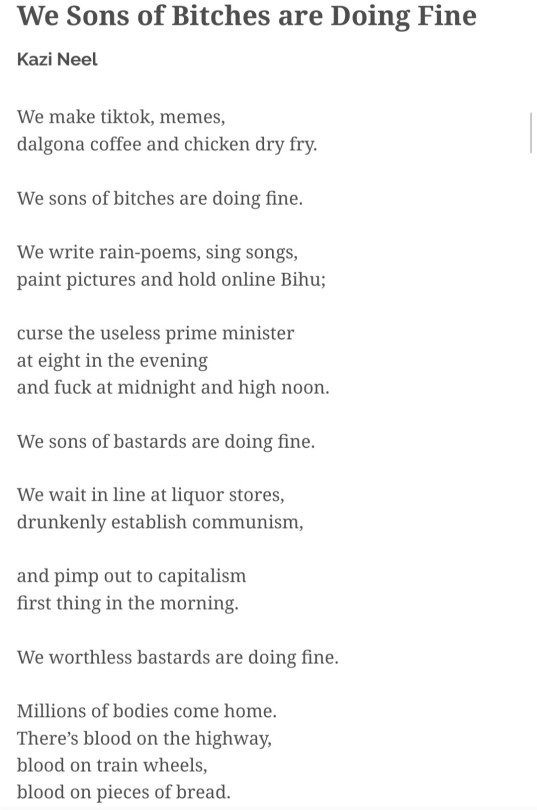
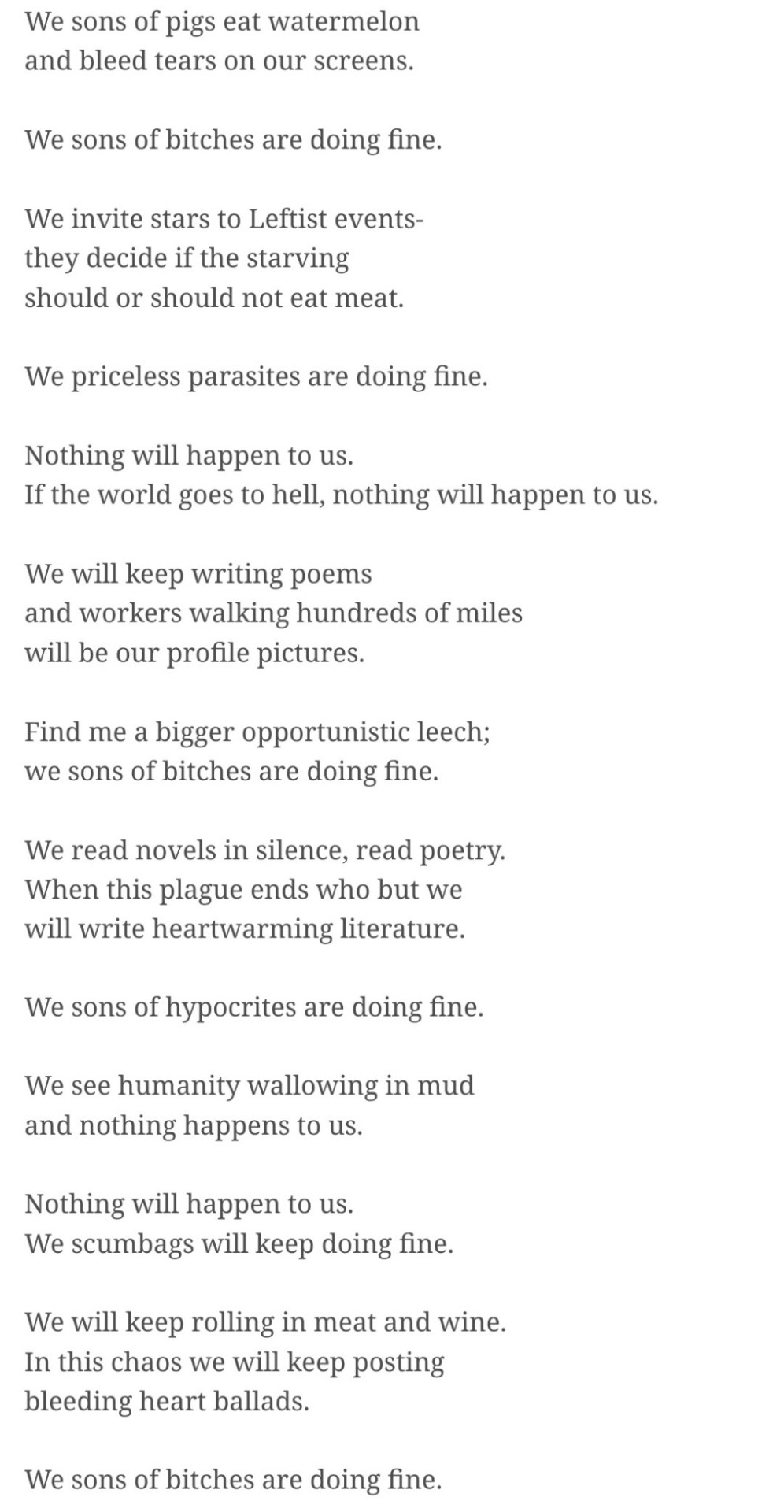
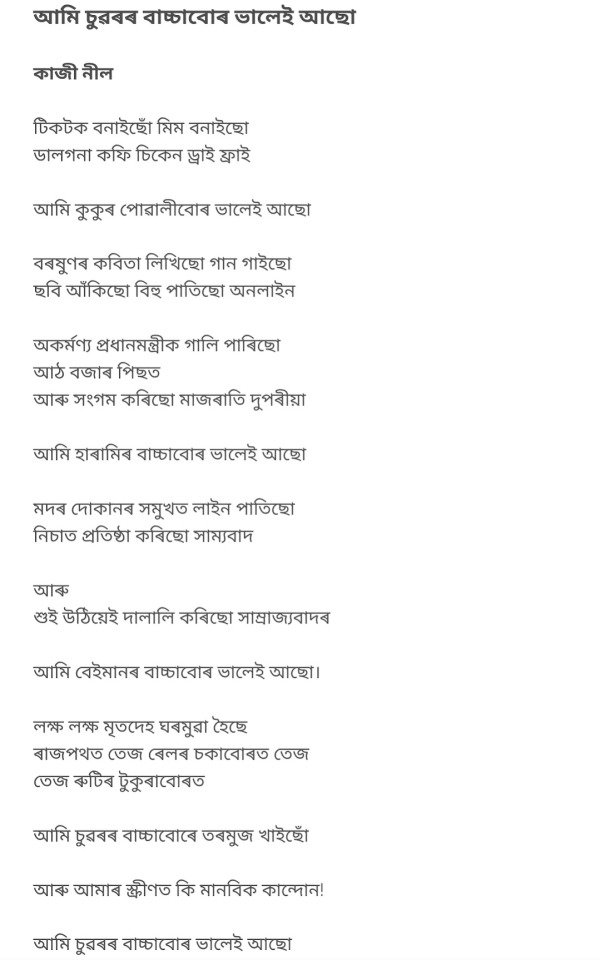

#We Sons of Bitches are Doing Fine#Poetry#Described#I think the original language is Assamese (according to Google) but it may be wrong#Please correct me if so#Sorry I can’t make a hyperlink because I use a third party mobile app for tumblr#And the line breaks are weird on this app too apologies!
752 notes
·
View notes
Text


(I’m just a boy.)
Moi tu mathu eta lora,
Tumi muk jani ki koriba?
Mur kotha beleg,
Moi xoijyo kori lom.
Tumi aru tumar jibon,
Eku nohoi jate tumar.
Tumi aru tumar xopun,
Eku nohoi jate tumar.
Tumi uri gusi juwa jun tu le,
Tumi mur sinta nokoriba.
Muk janibo khuji,
Mur logot thaki najaba.
Moi tu mathu eta lora,
Tumi muk jani ki koriba?

Translation:
I’m just a boy,
What will you get by knowing me?
My situation is different.
I’ll embrace the suffering.
You and your life,
it shouldn’t go in vain.
You and your dreams,
chase them, make them come true.
You go, escape — fly to the moon.
Don’t you worry about me.
And don’t you try to stay back
by trying to know me.
I’m just a boy,
What will you get by knowing me?
Avis
May be my first ever Assamese scribble. It came to me in like seconds and I penned it down.
Mon gol kiba eti likhibole. :))
Morom <3
38 notes
·
View notes
Text

#assam floods#assamese#original poem#poemas de amor#poems on tumblr#love poem#poem#spilled poem#poemas en español#poets on tumblr#poetic#poets corner#poetry#writersofwordpress#writers on tumblr#writer#writers#writeblr#excerpt from a story i'll never write#writeaway#l writes#writing inspiration#my writing#writing prompt#writblr#instagram
30 notes
·
View notes